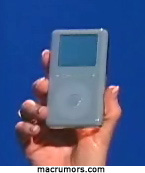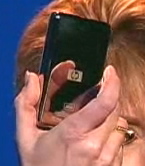
More details of the Apple/HP iPod agreement are starting to come to light. Many people have expressed surprise that the announcement wasn’t made during the Macworld keynote, where it would have made quite a splash. Apparently, the simple reason for that is that the Macworld keynote was on Tuesday, and negotiations were “completed only after an extensive bargaining session that ran long into Wednesday night,” according to the New York Times.
The agreement…represents a significant departure for both companies. For the first time, Mr. Jobs has stepped away from the self-enclosed Apple-only strategy he has pursued since he returned to run the company in 1997. Meanwhile, Hewlett, the second-largest computer maker in the world, has put its software partner, Microsoft, on notice that it will not necessarily follow its lead in every case.

Additionally, one (and only one) report — that at the moment, doesn’t seem to be taken terribly seriously by most people — claims that HP “will be working with Apple to add support for Microsoft’s superior Windows Media Audio (WMA) format to the iPod by mid-year.” Now, first off, the claim that WMA is a “superior” format is questionable in and of itself (I’ve seen people on both sides of the WMA vs. AAC argument being equally rabid), and tossing that adjective into a single-sentence rumor shows enough bias that many people are discounting this rumor immediately. Additionally, the rumormonger is none other than Paul Thurrott, author of the WinInfo Super Site, who has been known to make some highly questionable claims when comparing Mac OS X and Windows in the past.
However, I’m not sure that this would be an entirely bad move on Apple’s part, if it’s true and if HP can talk them into it. Just as their partnership with HP will be opening up more potential avenues for the iPod and the iTunes Music Store, allowing Windows based iPod users to mix in previously-imported or downloaded WMA files along with their .mp3/.m4a library could give Windows users even more reason to jump on the iPod bandwagon. I wouldn’t be suprised at all if Apple has lost some iPod sales simply because there were people who were interested, but already had a large library of music encoded in WMA format, and would rather go with a competing .mp3 player than face having to re-import their entire music library.
While this may be nothing more than a Windows fanboy’s rumormongering, I’m not so sure that it should be dismissed so casually and out of hand. There may not be any way of knowing the truth until an official announcement is made one way or the other, but I think that there are potential upsides worth paying attention to.
iTunes: “ToriMix v2” by DJ Wüdi from the album Difficult Listening Hour (2001, 46:37).



